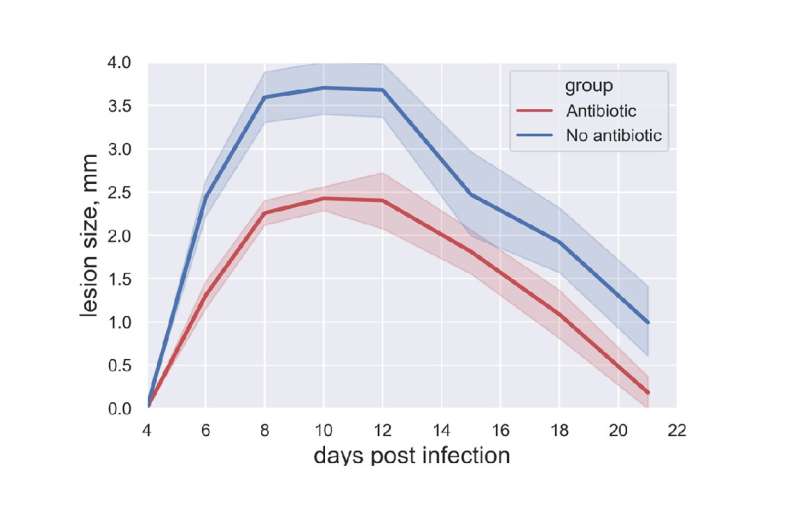Skin bacteria may boost immune response of mice infected with smallpox vaccine

The global eradication of smallpox in the 1980s was achieved by intradermal vaccination with vaccinia virus. A study published in PLOS Pathogens by Evgeniya V. Shmeleva, Brian J. Ferguson and Geoffrey L. Smith at University of Cambridge, United Kingdom and colleagues shows that there is a large increase in skin bacteria and suggests that this may enhance the immune response.
The smallpox vaccination was administered via multiple skin punctures and this method of vaccination may have introduced local bacteria into the vaccination site. However, the effect of smallpox vaccination on skin microbiota and whether these bacteria affect vaccination efficacy is not well understood. To investigate the role of bacteria in the immune response to smallpox vaccination, researchers used a mouse model with germ-free mice as well as normal mice, some of which were treated with antibiotics. The mice were vaccinated with vaccinia virus, after which the researchers analyzed the immune responses of each group.
The researchers found a 1000-fold increase in skin microbiota, larger lesions, and higher levels of antibodies after intradermal vaccination of mice that were not germ-free, suggesting an enhanced skin-based inflammation response in the presence of bacteria. Germ-free or antibiotic-treated animals had smaller infection-related lesions and less skin inflammation. However, all groups had equal numbers of memory T cells and similar protection from re-infection. The study was limited to vaccination of mice with vaccinia virus and further research is required to determine if these results in mice can be extrapolated to either other vaccines or to vaccination of humans.
According to the authors, "This study highlights a role for commensal bacteria in enhancing the immune response following dermal vaccination and has implications for other vaccines based upon infectious poxviruses or other viral vectors that are delivered by dermal vaccination."
The authors add: "We discovered that dermal vaccination with the smallpox vaccine led to a large increase in local bacteria, which increased the vaccination lesion size and affected the immune response. This suggests that manipulation of commensal skin microbiota might be a way to enhance the efficacy of intradermal vaccines."
More information: Smallpox vaccination induces a substantial increase in commensal skin bacteria that promote pathology and influence the host response, PLoS Pathogens (2022). DOI: 10.1371/journal.ppat.1009854
















